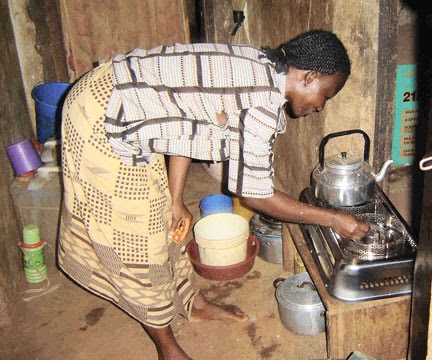Gender Dimension to Deforestation in Nigeria
As environmental managers on a daily basis and over the years, the environment has always been closely linked to women. Hence, the principle of ‘Eco-Feminism’ states that women are closer to nature than men. The notion is that since men in the villages migrate to cities to look for jobs, women at home interact and nurture the environment better just as they care for their children.
After all, women manage waste and are responsible for the hygiene and cleanliness of their surroundings. In the African setting, there is a cultural relevance of community involvement in environmental cleaning which is based on the traditional belief that, it is what a person gives to the land that the land gives back to him or her. For instance, in the Niger Delta region of Nigeria, women are said to actively participate in clearing up the farmlands in the event of oil spills.
In Yoruba land, South West Nigeria, women in the villages form themselves into groups to take care of their environment. This is aptly captured in the Yoruba saying: “Eni ba tun ile se, ni ile ngbe” meaning “whoever takes care of the land, the land rewards.”
Thus, traditional societies in Africa have always imbibed the concept of sustainability which is in line with the objectives of the 1987 Brundtland Report on Sustainable Development. Basically, this means the development that meets the needs of the present generation without compromising the ability of future generations to meet their own needs. Indeed, women as traditional custodians of the environment are major stakeholders.
Women’s Role in Rapid Decrease of Forest
Women living in rural communities are mostly indicted for depleting forest reserves because the majority of them are responsible for collecting firewood to cook meals for their families and fodder for their domestic animals.
Poverty is not also making life easier for these women as they have no choice than to use firewood for cooking, especially since kerosene, gas, and electricity are not even affordable and accessible. In other words, as poverty increases, the demand for wood and charcoal also increases. This therefore defines the gender dimension of deforestation because women depend on forest resources to survive.
The Forest
It is well known that the forests provide a natural habitat for various species of animals, birds and other forest creatures. It further provides basic resources for humankind which enables everyone to meet their daily needs.
Therefore, when rural dwellers depend on the forest for their basic needs and livelihood, there are adverse consequences on the environment such as, loss of soil moisture, soil erosion, shortage of forest products, flooding, desertification, drought and climate change.
Forest creatures also tend to migrate further inward in search of alternate habitats while some are killed in the process. It is therefore right to say deforestation exacerbates biodiversity loss.
What is Deforestation?
It is simply the clearing away of forests. “It is the process by which an area is deprived of existing natural forest vegetation and resources. This can be brought about by felling of trees, indiscriminate logging, or total clearing of existing vegetation for arable farm or industrial purposes.
Deforestation is also the destruction of vast areas of forest without planting new growth and it includes unsustainable agricultural forestry practice and the over-exploitation of wood products for use as fuel.” In Mau Ogiek v Kenya, the African Court on Human Rights held that an intact forest is more valuable than a cleared forest.
How Deforestation affects the Health of Women
When the environment deteriorates or when industrialization makes a great demand on the forest, it greatly impacts on women.“Experts claim that the smoke generated by firewood exposes women to diseases such as tuberculosis and lung cancer. Cooking with firewood also equates to inhaling 20 packets of cigarette daily. Regrettably, a recent report on climate change says at least 150,000 Nigerians die every year as a result of this harmful smoke.
And out of the total number, women represent the biggest chunk because women are still exclusively saddled with the responsibility to cook.”Definitely, the quality of the life of women is determined by the quality of their environment. It is essential to note that, Articles 18 and 19 of the Maputo Protocol to the African Charter 2003 recognizes women’s right to Sustainable Development and equally the right to live in a healthy and sustainable environment.
Are Women statutorily empowered to protect the Forest more?
Even though women are involved in a wide range of forest-related activities, the response is that biological differences are not so much pronounced in environment matters because it is a collective effort to care for the forest environment, but gender is basically highlighted since rural women are mostly seen as farmers, hewers of wood and haulers of water.
However, they are hardly never consulted when sustainable policies on environment projects are embarked upon in their respective communities; and of course, nobody considers womens roles in sustaining the environment due to cultural and societal bias.
Role of Environmental Law
Sadly, Nigeria’s Forestry Law is 80 years old this year, 2017, which is overdue for review. However, each State government has its forestry laws while the general protection of the environment is the responsibility of the National Environmental Standards and Regulations Enforcement Agency (NESREA), an umbrella arm of the Federal Ministry of the Environment. Section 20 of the 1999 Constitution equally places an obligation on the Nigerian Government to protect the forests while few of the international instruments on the Environment provides that State Parties should place women at the Centre of Sustainable Development for the benefit of future generations.
Unfortunately, these instruments are not legally binding on State Parties. Additionally, there are modern provisions in the Forest Principles of 1992, the United Nations Forum on Forests and the Africa Forest Law Enforcement and Governance which State governments can import into their mostly obsolete laws to tackle the spate of deforestation in their domain. The contention is that Law should be proactive in addressing environmental ethics which makes everyone conscious about using their natural resources in a prudent and rational manner.
Ethics can re-orientate the rural woman’s ignorance and consequences of her actions. She can be taught to emulate historical women defenders of the forests such as the Chukpo Andolan Movement in India and the Kenya Green Belt movement led by the late Nobel peace Laurete, Mangari Wathai. Through law, it is imperative to sensitize the citizenry to the impacts of environment problems that are not equally felt by all population groups; leaving women and children to bear the greatest burden.
Conclusion
One thing is clear. Deforestation cannot be perceived from a gender perspective alone; therefore it is not safe to leave the management or protection of the forests to women. Men are equally guilty because they engage in wood exports, overgrazing,
cattle ranching and bush burning – The situation is so bad that in 2016, the President of the Forestry Association of Nigeria declared that Nigeria loses about 400,000 hectares of forest to deforestation every year. It is hereby submitted that forest resources are finite therefore we must all use them in a sustainable manner. The Government should also play its part by providing safer alternatives for cooking to protect the lives of these rural women and their environment.
The author of this paper, Oluwatomi Ajayi heads the Research Committee of the African Women Lawyers Association (AWLA Nigeria).





